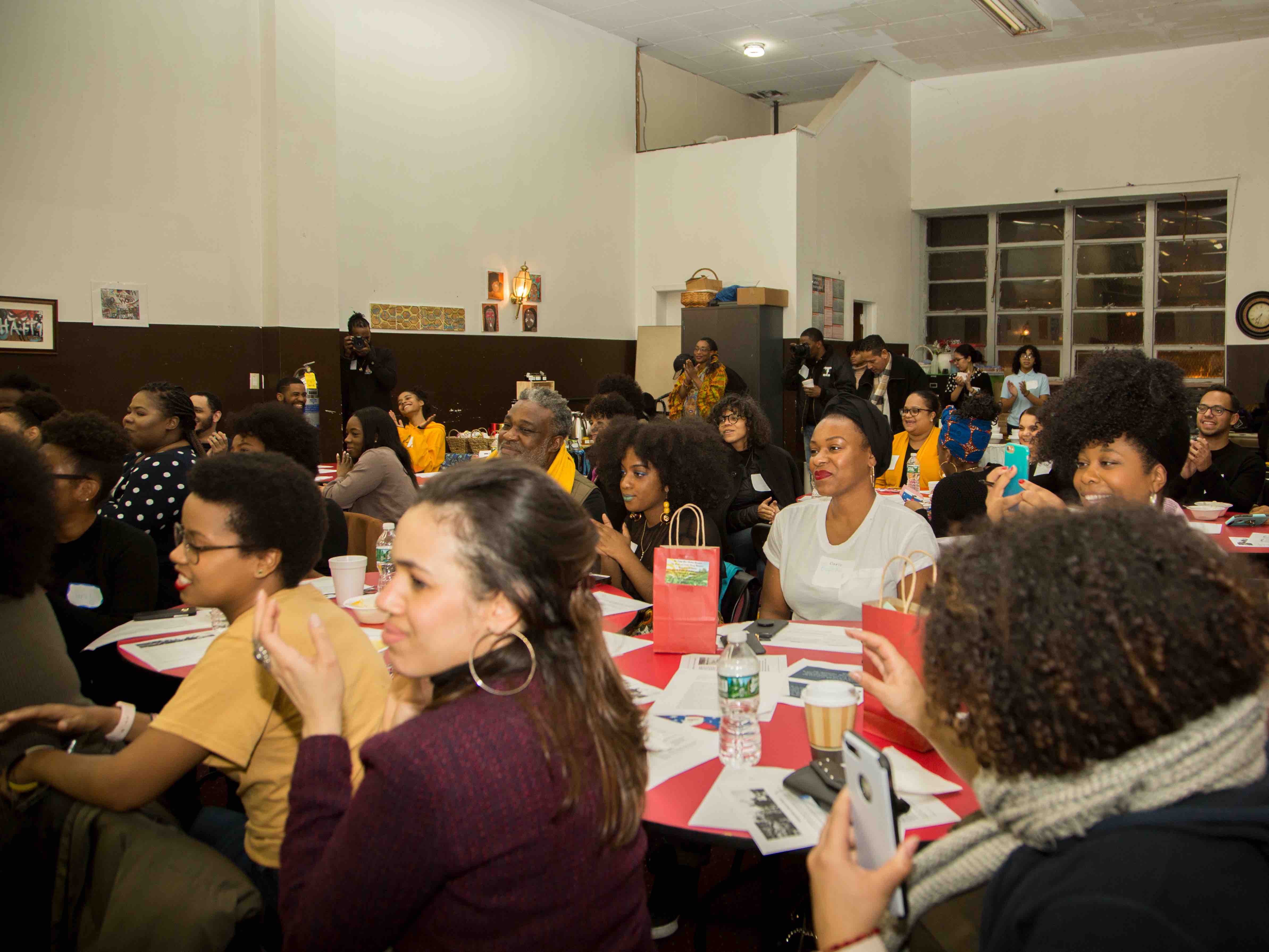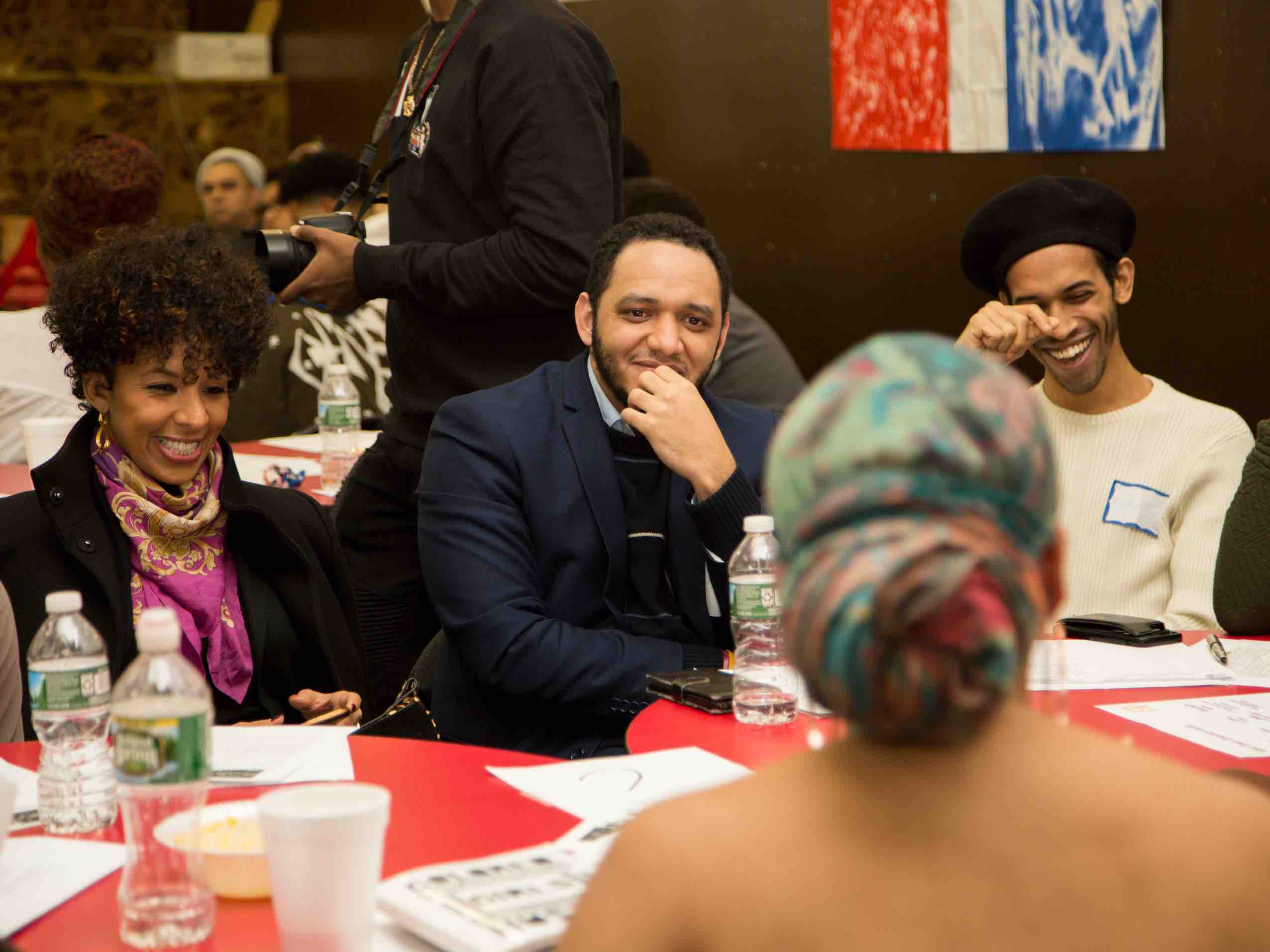It was a rainy Friday evening in November, but First Spanish United Methodist Church, commonly known as “the people’s church,” in East Harlem was filled with Afro-descendants, a majority with roots planted on the Caribbean island of Hispaniola. Tables and chairs fit for safe, intimate group discussions; a projector and vast white wall, which displayed a presentation on the history of Haiti and the Dominican Republic – extremely insightful yet, at times, horrific; revealing portions of a past that’s been intentionally altered – and an element that unites most: food. With the second installment of the event series Decolonizing Hispaniola, titled “Sancocho and Soup Joumou Edition,” attendees learn how both soups derived from their respective side of the island, how they were served, and the cultural significance they shared. In the process, guests nourished their bodies and minds as they delved into more than 500 years of history.
France François, founder and CEO of In Cultured Company, welcomed participants in the same space the Young Lords Party took over in December 1969. Similar to the Young Lords’ 11-day overtaking, François and her team of facilitators’ focus is on community. They equipped guests with unbiased information and an understanding of historical narratives that have promoted identities and world views that have led to tensions.
For the international development and conflict resolution specialist, Decolonizing Hispaniola was created to debunk the propaganda generated by those in power on both sides of the island, create room for transformative conversations, and establish a structure to bridge the existing divide.

“I wanted to do this through a conflict resolution lens and really think about what reconciliation, collaboration and dialogue would look like between Haitians and Dominicans, and start to dismantle the systems of oppression that have purposely divided the island and kept the elite in power,” François, who worked in her home country of Haiti after the 2010 hurricane, tells me. “The work that we’re doing here to really build a new generation of leaders that would own this specific work of conflict resolution and healing, social justice; and choose their own collective liberation. What I’m sure became obvious to a lot of people when you experience Decolonizing Hispaniola is that our liberation, our freedom, is so intricately linked that there is no way there is a free Haiti without a free DR, and vice versa.”
Only minutes into the presentation, that became clear. Although the island was divided between the French and Spanish, events and leadership virtually mirrored one another; and when both sides of Hispaniola (Santo Domingo becoming Spanish Haiti) were united under Jean-Pierre Boyer, they faced challenges. Even when Spanish Haiti separated from the western part of the island for economic reasons, Haiti supported the Dominican War of Restoration through arms, making Hispaniola the first and only free region in the western hemisphere.
Threats of re-enslavement remained, and that shared concern was captured in a note, which François read aloud, from Dominican rebels, “How can two peoples composed of the same race, the same political interests, ruled by republican institutions, and who have lived together as good friends, look at each other with indifference when one of them is in danger?”
At the close of the hour-long presentation, provided by François and Saudi Garcia, a doctoral student in New York University’s Department of Anthropology, it opened up for dialogue among the tables and it was made known that those in attendance who weren’t Haitian nor Dominican should actively listen, and descendants of the island were in a safe space to express their thoughts.

François recalls an instance from the first event where a Dominican woman quietly cried. She eventually opened up, sharing, “‘I’m crying because when you guys said that we don’t know the number of people who were killed in the Parsley Massacre, because the bodies were burned where they were thrown into the river, I know that to be true because my father did the burnings,’” François recounts. The Parsley Massacre (or El Corte), occurred in October 1937 under Rafael Trujillo, claiming the lives of 10,000 to 30,000 Haitians and Dominican-Haitians.
The woman, who appeared to be in her 40s, carried that trauma with her for the majority of her life, but didn’t want to pass that on to her son. Instead, she’s healing alongside him, and invited him to attend with her.
The In Cultured Company team introduced a similar, lesser-known incident –Massacre des Vêpres Jérémienne – that took place under Haitian president François “Papa Doc” Duvalier, in which an entire mulatto community was massacred.
Attendee Gabi Thorne, who is of Dominican and Bajan descent, didn’t grow up hearing stories surrounding Dominican-Haitian relations, but became more aware of some of the anti-Haitian comments made by family members and grew adamant in correcting them after studying abroad in the DR. Although she studied on the island, she wasn’t aware of the mass killing of mixed race people during Papa Doc’s tenure.
“While not surprising, hearing about how violence was committed against mulattos was definitely shocking,” says Thorne, a writer and recent Harvard University graduate. “Hearing about the noirism ideology really intrigued me because negritude movements were happening in other parts of the Caribbean and the world, and I am looking forward to researching more about the ideology.”
It’s this type of reflection and active inquiries, as well as challenging of the history and people who benefit from the tensions, that confirms the programming François has implemented – and tweaked several times over – is working.
“The beauty of building this from the ground up is that we get to ideate and pilot new ideas, and also take the feedback that we get from the guests and make it better,” François says. “That’s the plan for 2019 to continue to move through the different steps and continue to build with new groups of people, and then eventually, lastly, take it to the island and work with people on the island to do this work together.”
Follow In Cultured Company on Instagram to learn about upcoming events.







